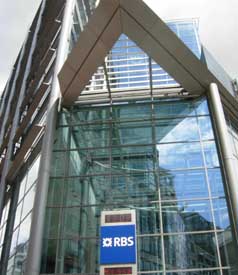Yesterday, the City of London experienced a “new Big Bang,” that wave of financial deregulation initiated by Margaret Thatcher, who allowed the British capital to impose itself as the world’s premier financial center. This shock is of an entirely different character. The British want to see the series of announcements yesterday as the last act in the 2008 financial crisis. Two big banks, the Royal Bank of Scotland (RBS) and Lloyds, are going to raise close to fifty billion pounds in fresh money, three-quarters of it supplied by the taxpayer. That’s even more than the sums mobilized at the height of the crisis to save them from bankruptcy by nationalizing a good part of their capital. They will not pay out any cash bonuses to employees earning over 39,000 pounds, that is, to either traders or management. They commit to spinning off activities that represent 10 percent of British retail banking. A promise required by Brussels, which will be closely monitoring its implementation. Finally, the sector is making layoffs: 3,700 positions at RBS and 1,700 jobs at HSBC, which suffered less from the crisis.
This crazy day reminds us that the United Kingdom is the big country that has far and away suffered the most from the financial crisis because its bankers pushed all the market’s madness, innovations and greed further than any others. According to IMF estimates, the assets written off by United States and Euro-zone banks from 2007 to 2010 should represent 7 percent of GDP versus … 43% for the United Kingdom. It also shows that Europe, under pressure from the European Commission, is choosing competition as the solution to the crisis. The banks that sinned are condemned to break up and that explosion should feed competition by opening the game to new rivals from the financial or other sectors. In Great Britain, a very closed market where margins are very high in consequence, the Treasury hopes there will eventually be three more retail banks. Break-up – already decided for the Dutch ING, and to come for the German Commerzbank, the Belgian KBC and the Franco-Belgian Dexia – could also revive a too-weak competition in finance. Will the European Commission succeed in imposing its rule and in effectively fighting the emergence of ever more dominant banks? It would be a pretty paradox to see Europe betting on competition while America plays oligopoly with the creation of true banking mammoths.
————
Translation: Truthout French language editor Leslie Thatcher.
Join us in defending the truth before it’s too late
The future of independent journalism is uncertain, and the consequences of losing it are too grave to ignore. To ensure Truthout remains safe, strong, and free, we need to raise $43,000 in the next 6 days. Every dollar raised goes directly toward the costs of producing news you can trust.
Please give what you can — because by supporting us with a tax-deductible donation, you’re not just preserving a source of news, you’re helping to safeguard what’s left of our democracy.
